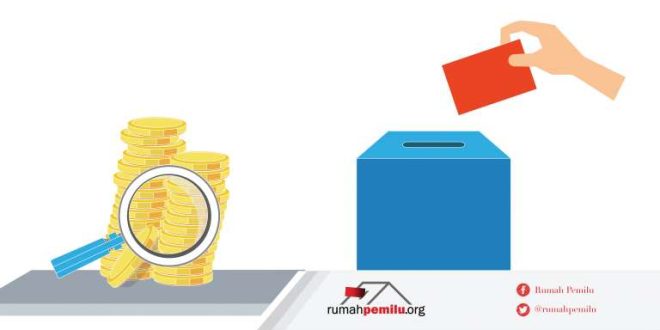The General Election Commission (Komisi Pemilihan Umum or KPU) has released the Initial Campaign Fund Report (Laporan Awal Dana Kampanye – LADK) for the presidential and vice-presidential candidate pairs through the Campaign and Campaign Fund Information System (Sistem Informasi Kampanye dan Dana Kampanye or Sikadeka). Through this report, the amount of the initial funds for each presidential and vice-presidential candidate pair can be identified.
The forms of campaign funds recorded in the LADK include money, goods, and services from presidential and vice-presidential candidate pairs, political parties or coalition of supporting parties, individuals, groups, as well as non-governmental companies and enterprises. However, Sikadeka is still considered not to display campaign fund reports transparently because it only includes the source, amount of receipts and expenditures of campaign funds, and does not show the timing and identity of contributors.
Based on the LADK Report on the Sikadeka website, Anies-Muhaimin is recorded to have the smallest initial campaign fund, amounting to IDR 1 billion. Meanwhile, the Prabowo-Gibran pair is noted to have the largest initial campaign fund, with a total amount of IDR 31,438,800,000. This amount comes from the candidate pair themselves, contributing IDR 2 billion, political parties or supporting coalitions providing IDR 600 million in the form of goods, and IDR 28.8 billion in the form of services.
Meanwhile, the total initial fund for Ganjar-Mahfud is IDR 23,375,920,999. This amount comes from the candidate pair contributing IDR 100 million, political parties or a coalition of parties providing IDR 2.9 billion, contributions from other non-governmental entities amounting to IDR 20.3 billion, and individuals contributing IDR 1.6 million.
However, based on the findings of the Association for Elections and Democracy (Perkumpulan untuk Pemilu dan Demokrasi or Perludem) and Indonesia Corruption Watch (ICW), the three presidential and vice-presidential candidate pairs are suspected of not reporting campaign advertisements on social media to the Election Commission (KPU). Despite the Sikadeka reporting design allowing for the update of campaign fund receipts and expenditures at any time.
During the period of November 16 to December 15, 2023, Perludem and ICW conducted a search for campaign advertisements on Meta’s social media platform. The search, using Meta’s Ad Library feature, utilized keywords of the names of the presidential and vice-presidential candidate pairs, subsequently displaying the content of the advertisements and the amount spent by the advertisers.
In the event of the release of findings by Perludem and ICW titled “(Masih) Basa-Basi Dana Kampanye [(Still) Campaign Fund Chit-chat],” Kahfi Adlan Hafiz, a researcher from Perludem, presented that campaign advertisements on Meta’s social media platform for the Anies-Muhaimin pair reached 444 million in one month. This amount was advertised by 15 accounts suspected to be supporters or sympathizers of candidate pair number 1.
Candidate pair number 2, Prabowo-Gibran, spent a campaign advertisement cost on social media amounting to 778 million. The ads are suspected to have been paid for by 33 accounts supporting Prabowo-Gibran, using names identical to candidate pair number 2.
Meanwhile, the campaign advertisements on social media for the Ganjar-Mahfud pair amounted to IDR 829 million in one month. These ads were created by 87 accounts suspected to be supporters and sympathizers of Ganjar-Mahfud.
“Campaign advertisements on social media should be reported as third-party contributions. This is because the advertiser accounts are suspected not to be official accounts of the presidential and vice-presidential candidates. Such contributions should be recorded as in-kind contributions,” said Kahfi on December 20.
Furthermore, Kahfi mentioned that the use of campaign advertisements on media should be closely monitored by election organizers, especially the Election Supervisory Body (Bawaslu). The existence of Meta’s ad library tools and other social media platforms accessible to the public should be utilized by Bawaslu to monitor and serve as comparative data for campaign fund expenditure reports.
He also emphasized that Bawaslu needs to further investigate the accuracy of the LADK Report submitted by the three presidential and vice-presidential candidate pairs regarding the sources of political campaign funding. This is seen as crucial to ensure that LADK reporting is not merely an administrative formality.
“It’s not just the campaign ads on social media, but also the very large billboards that adorn the city, but these are not visible in the LADK,” he said.
Meanwhile, Heroik Pratama, a researcher from Perludem, explained that in Law No. 7/2017 (Election Law), there are already specific provisions stipulating the obligation of political parties participating in elections, presidential and vice-presidential candidate pairs, as well as candidates for the House of Representatives (DPR), Regional People’s Representative Council (DPRD), and Regional Representative Council (DPD) to report campaign funds, including both receipts and expenditures. However, he still doubts the accuracy of the campaign fund amount if the LADK does not disclose the identities of contributors and lacks periodic reporting.
Moreover, he continued, on December 14th, the Financial Transaction Reports and Analysis Center (Pusat Pelaporan dan Analisis Transaksi or PPATK) reported the discovery of suspicious transactions amounting to trillions during the campaign period. This finding indicates the alleged flow of campaign funds originating from illegal mining and money laundering from other criminal activities.
“Therefore, the validity of the information presented in the LADK becomes crucial. Transparency and accountability are crucial pillars in minimizing corruption and strengthening public oversight,” said Heroik.
Heroik also explained that the submission of campaign fund reports should not exceed the limits stipulated in the Election Law. According to the rules, the LADK and the Special Campaign Fund Account (Rekening Khusus Dana Kampanye – RKDK) for presidential and vice-presidential candidates must be reported 14 days after being officially designated as candidates. As for political parties participating in the election and candidates for the DPR, DPRD, and DPD, they should report the initial campaign funds 14 days before the campaign starts.
Then, continued Heroik, the Campaign Fund Receipts and Expenditures Report (Laporan Penerimaan dan Pengeluaran Dana Kampanye – LPPDK) is submitted by the Election Commission (KPU) for auditing by a public accounting firm no later than 15 days after the voting day. He stated that these rules are aimed at maintaining transparency and accountability among election participants.
“In fact, before being officially designated as candidates, they have already conducted campaigns through various advertisements, and it should also be reflected whether the funding comes from the personal funds of the candidate pair, supporting parties, or other sources,” he added.
Furthermore, he explained that according to Article 339 of the Election Law, election participants and campaign teams are prohibited from obtaining campaign fund contributions from foreign entities, unclear contributors, proceeds of criminal activities, all government elements, and village governments. This prohibition, based on Article 330 of the Election Law, may result in disqualification and not being declared as elected candidates if they win the election.
“So it should be well recorded in the Initial Campaign Fund Report. The publication of campaign funds is important to provide a more detailed explanation, whether Sikadeka is real-time data, so that it is not ambiguous, and there are no discrepancies in the data. We need to see the details, and the identities of contributors should also be open to the public,” explained Heroik.
Meanwhile, Egi Primayogha, a researcher from the Political Corruption Division of ICW, stated that campaign fund information is a public right that must be provided. Therefore, clear information reflecting actual receipts and expenditures should be reported. This is considered important for assessing conflicts of interest and minimizing the potential for corruption.
“Political corruption doesn’t only occur when candidates are in office; it can happen even before they contest in the election, for example, through the already rampant practice of transactional politics,” explained Egi.
In addition, he believes that the high cost of politics also creates room for the influx of illegal funds into campaigns. Egi suggests that Bawaslu needs to promptly follow up on the PPATK findings regarding suspicious transactions entering campaign accounts.
“So law enforcement, including the KPU and Bawaslu, must consider campaign fund transparency as a serious matter,” he concluded.
Translated by Catherine Natalia
 Rumah Pemilu Indonesia Election Portal
Rumah Pemilu Indonesia Election Portal




